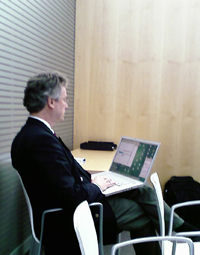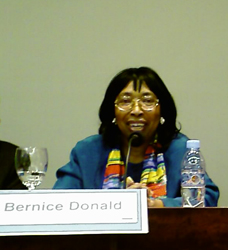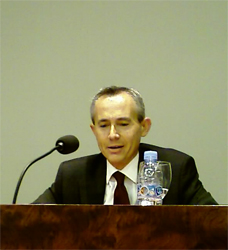By Ismael Peña-López (@ictlogist), 08 March 2007
Main categories: e-Government, e-Administration, Politics, Meetings
3 Comments »
On Thursday March 8th, 2007, a workshop on e-Government is taking place at the IN3 headquarters in Castelldefels, Spain, among researchers from the Oxford Internet Institute and the Internet Interdisciplinary Institute. Here come my notes for the first part of the workshop:
Network Societies
Eduard Aibar, UOC‘s vicerector of research, presents the Households branch of the Internet Catalonia Project.
Bill Dutton then presents their research, focusing in a couple of aspects. The first one, is the huge interest in the digital divide, related to the economic divide, a great barrier for any enhancement or fostering of the Information Society anywhere. The second one is what he/they [at the OII] call the digital choice: a lot of people choose not to use the Internet, even if they could, because they’re not interested in it, it just does not add value to them. It looks like it is really related to age to stand in the analogue paradigm/world.
 Bill Dutton
Bill Dutton
Dutton then goes to the issue on how the Internet is affecting our social skills and relationships. He states that when using online media you reshape your [physical] network and get to know and relate to people that, otherwise, you (surely never) would never ever meet.
One of the points Dutton puts more stress in is in trying to change — or, at least, influence — the work of policy makers, in the shape of policy guidelines or recommendations. On the one hand, public funds pay most of the research they’re doing, so trying to influence the public sphere becomes sort of a payback for this funding. On the other hand, putting it to practice is a means to see how research is connected to reality and what exactly is its use.
eGovernment, eJustice
Agustí Cerrillo speaks about e-Government as not the automating of the Administration, but a deeper change. In this line, the actual legal [public] framework in Spain does not really provide a good environment to innovate in this subject, though there are plenty initiatives in the field. And even if the legal framework is being adapted to e-Administration/e-Government — by publishing new e-Government laws —, the day-to-day reality in the Administration is not being changed that much.
Research in public information and electronic access to this information by the citizens is a key issue, in three aspects:
- Use and diffusion of public information, and also the reuse of this public information
- Dangers and damages that public information can cause: quality of public information, use and misuse of this information for good/bad purposes
- Public sector information accessibility, that should be universally available online
Pere Fabra then talks about e-Justice and the research and report on e-Justice in Latin America carried on last year [the full report can be downloaded here ( , 4.69 Mb)]. For Fabra, the best output was not the data raised by the research but the (new) methodology created to do the research, a relatively virgin field that requires further work to obtain accurate indicators and means to measure the state of e-Justice. One of the best findings was that leadership was really crucial in the fostering of e-Justice strategies and projects, hence this was one of the most stressed recommendations when the report was presented, that any initiative in this field should begin with a good leadership design.
, 4.69 Mb)]. For Fabra, the best output was not the data raised by the research but the (new) methodology created to do the research, a relatively virgin field that requires further work to obtain accurate indicators and means to measure the state of e-Justice. One of the best findings was that leadership was really crucial in the fostering of e-Justice strategies and projects, hence this was one of the most stressed recommendations when the report was presented, that any initiative in this field should begin with a good leadership design.
Bill Dutton and Rebecca Eynon introduce some more projects in this same area of knowledge, among them Government on the Web — dedicated to improving knowledge and understanding of e-government and the impact of web-based technologies on government
— and Network Democracy 2.0.
During the debate, it is stressed the point that e-Administration or e-Government usually focus on the executive power but usually forget the legislative power. It might be a matter of efficiency, in the sense that Government action is more likely to be evaluated, changed or enhanced, but it might also be that the legislative power is less prone to change and it deals with more “delicate” issues for the citizenship itself, so “it better remain untouched” before avant-garde ideas settle down and prove their goodness.
About public information in the Internet, it’s weird to realize that most people will say that they are not interested in public sector information or Administration websites, but they do search the Internet for Health or Education information and, most times, they end up reading Public Administration websites, either being aware of if but either being not, i.e. searching and finding in Google what they’d never search or even find in the Government website. Thus, research in this field of public information and public services should be reshaped to really get the relevant data despite what the citizen wants to say about what he does or about what he think he does.
OII-IN3 Workshop on e-Government (2007)
By Ismael Peña-López (@ictlogist), 07 March 2007
Main categories: Digital Divide, e-Readiness, ICT4D
No Comments »
The International Telecommunication Union has issued their report on world telecommunications: Measuring the Information Society 2007: ICT Opportunity Index and World Telecommunication/ICT Indicators.
The most relevant news is the publication of a new ICT index called the ICT Opportunity Index, which is the result of the merger of the ITU’s Digital Access Index (DAI) and Orbicom’s Monitoring the Digital Divide/Infostate conceptual framework
.
It is important to note that this new index is the one that UNCTAD used in their Information Economy Report 2006, and it is not the same one as the Digital Opportunity Index. While this last one, the DOI (published in the World Information Society Report), is the result of agreeing some basic common indicators to measure the Information Society, the so called ICT core indicators, the first one, the ICT-OI goes far beyond the focus on infrastructures of the DOI and includes categories such as skills, uptake and use intensity.
By Ismael Peña-López (@ictlogist), 02 March 2007
Main categories: ICT4D, Nonprofits
No Comments »
Authored by Michael Cortés and Kevin M. Rafter, this book identifies the ways that new information and communication technology both help and hinder nonprofit effectiveness. The book establishes a body of dependable research on the subject, compiling the resources needed to make better technology-adoption and management decisions in the nonprofit sector
.
The table of contents looks promising, but I guess, at this stage, that I’d rather read a publication about this subject in the shape of a handbook, the way Ellis and Cravens did in The Virtual Volunteering Guidebook. And I think practitioners are, too, in the need of something practical that tells them, step by step, specific solutions to specific problems, such as free software applications, database creation and managing, etc. Of course, just my opinion.
Posted at the Bytes for All Readers & Supporters Forum by Frederick Noronha.
By Ismael Peña-López (@ictlogist), 27 February 2007
Main categories: Hardware, ICT4D
No Comments »
We have here talked about the subject of mobile phones for development several times. Positively, as a proven and effective tool to let poor people access the Information Society, when other more costly infrastructures are unexistent and/or cannot be provided — because of cost or because of technical difficulties (say, cost again, as almost every and each difficulty can be overridden with money). Negatively, as mobile phone in lesser developed countries usually relies on GSM networks, hence, low band networks that while providing access, it is a less quality access than broadband — fixed and mobile — networks provide in developed countries, thus widening the digital divide.
Nicholas P. Sullivan now provides us with another example on how can mobile telephones enhance both local development and Information Society fostering, by explaining the GrameenPhone experience in Bangladesh, something we already reviewed when we talke about the Village Phone Replication Manual.
Sullivan’s book, You Can Hear Me Now: How Microloans and Cell Phones are Connecting the World’s Poor to the Global Economy
offers a compelling account of what Sullivan calls the external combustion engine —a combination of forces that is sparking economic growth and lifting people out of poverty in countries long dominated by aid-dependent governments. The “engine” comprises three forces: information technology, imported by native entrepreneurs trained in the west, backed by foreign investors.
The book has two parts. The first one, The GrameenPhone Story, about why and how the project took place, and the second one, Transformation Through Technology, seemingly devoted to reflection and analysis.
See also:
By Ismael Peña-López (@ictlogist), 27 February 2007
Main categories: ICT4D, Meetings
No Comments »
This is a reminder — for those RSS feed subscribers seldom visiting the site itself — of ICT4D Events, an agenda of seminars, congresses, workshops and other events in the field of ICT4D and the Information Society. Not a comprehensive list, but a selection based on two criteria:
- A first selection based on the subjects that do interest me, are reflected in this site and, potentially, interest the readers and visitors
- A second, natural selection based on what gets to me through RSS feeds, discussion lists and personal e-mail. What I don’t read, drops its probability of appearing here ;)
Just to bring some content, I’d like to highlight three initiatives that during the next months will have — if I’m not wrong — their second edition.
In chronological order, the first one is the Second Annual ICT4D Postgraduate Symposium, where Tim Unwin’s ICT4D Collective will pass the responsibility of the event to the Karlstad University in Sweden. Last year’s event was impressive. A must for PdD students and highly interesting for ICT4D researchers in general.
The second one is the International Conference on ICT4D 2007. I missed last year’s, so I cannot tell, but as far as I can see, Bangalore has taken the place of Berkeley and Microsoft Research India has acquired relevant prominence chairing the event. An option to seriously consider.
Last, but not least, the Digital Divide Mini-Track in the framework of the 41th edition of the Hawai’i International Conference on System Sciences (HICSS-40), carefully organized, once again, by Karine Barzilai-Nahon. I had the chance — and pleasure — to be one of the referees of this mini-track’s communications and I can state that the quality standards were highest. You just can check the results of the mini-track Digital Library of Proceeding Papers for the 40th Annual Hawaii International Conference on System Sciences. A pity Hawaii is not really close to… err… anywhere, but it could be a very good Christmas (self)gift.
Thanks to Gudrun Wicander and Eduard Muntaner for the tips.
By Ismael Peña-López (@ictlogist), 23 February 2007
Main categories: Cyberlaw, governance, rights, Open Access
1 Comment »
Yesterday I took part in a round table — not that “round” as we were more than 50 people sitting there — about The US experience in the protection of intellectual property on the Internet, led by US Judge Bernice Donald and US Department of State (US Spain Embassy) representative Mr. Carl Schonander, and coordinated by Enric Enrich and professor Raquel Xalabarder.
The event was somehow — and as expected — very correct — that curse of our times — but, nevertheless, there were interesting statements and reflexions, specially from Mr. Schonander’s side.
All in all, the short summary of the meeting was: Yes, it looks like law is far behind reality and is not responding to today’s society demands, but it has always been this way, and, no matter, both law and society will change approaching each other: society following the law, the law accommodating the new aspects of (digital) life.
Carl Schonander spoke about the US President foreign policy, stressing that Intellectual Property (IP) really was an important part of his agenda. In this aspect, the far best Schonander’s quote is the following: IP is the currency of modern commerce
. Thus, the importance for his President — and for most developed countries’ — of this subject.
US Foreign Policy in IP issues was even more important in countries with whom the US had strategical relations: Russia and China. After stating that governments (in general) should enforce law complying, and this should be their duty just for their own benefit, he accepted this was not that easy but, nevertheless, he had hope in this vision because China and Russia will change their minds [concerning generalized piracy] when their own industries have to rely on IP to develop their own competitiveness
.
Personally, and from the point of view of a non US citizen, I think this is a more powerful argument towards following the (international) rules than many others I have heard of, mainly based in dealing with problems in the lawsuit arena. The problem is how do you tell some countries (i.e. Bangladesh, India, South Africa or Brazil) to enforce the law when this law, clearly, goes against (a) their population’s interests (b) the government itself interests (because of their unpopularity). And this raised my first question, almost in the same way as I have stated it here.
Mr. Schonander’s answer was, I must admit, witty, as he was able to turn upside down the questoin: The main incentive for poor countries to respect IP is that foreign investment won’t go to them unless it is proven that a safe environment for business exists
. So, yes, you might think that prosecuting piracy is putting barriers to your country’s progress, but not doing it is closing your doors to foreign investment and, hence, also to foreign capital boosted progress. It will be most interesting to know where the balance is in whether protecting your “right” to access knowledge and your strategy to attract investors. On the other hand, Mr. Schonander also told the audience that there already was an agreement within the international treaties framework to help developing countries access medicines for public health … but not Viagra, for instance
. I suspect that most developing countries are not really happy with this “exceptional” clauses, judging by news headlines.
My second question — and following the thread of countries considering whether following the law or not — was that it looked like intellectual property was not as widely accepted as “material” private property, and that one of the reasons might be some bad behaviors of big enterprises threatening — I actually said “blackmailing” — smaller enterprises, countries’ governments and users in general to cease and desist and pay not to be sued for astronomical amounts of money.
He admitted that this was a sincere concern of the US Government — and the international community in general —, specially after the increase of patent trolling cases all over the world that were harming both the industry(ies) and the (international) market(s). And, thus, everyone’s progress at large.
I’d really like to thank him for sharing his vast knowledge in the field. Even if we are at opposite ends of the spectrum, it was absolutely enlightening to listen to him.

 , 4.69 Mb)]. For Fabra, the best output was not the data raised by the research but the (new) methodology created to do the research, a relatively virgin field that requires further work to obtain accurate indicators and means to measure the state of e-Justice. One of the best findings was that leadership was really crucial in the fostering of e-Justice strategies and projects, hence this was one of the most stressed recommendations when the report was presented, that any initiative in this field should begin with a good leadership design.
, 4.69 Mb)]. For Fabra, the best output was not the data raised by the research but the (new) methodology created to do the research, a relatively virgin field that requires further work to obtain accurate indicators and means to measure the state of e-Justice. One of the best findings was that leadership was really crucial in the fostering of e-Justice strategies and projects, hence this was one of the most stressed recommendations when the report was presented, that any initiative in this field should begin with a good leadership design.




